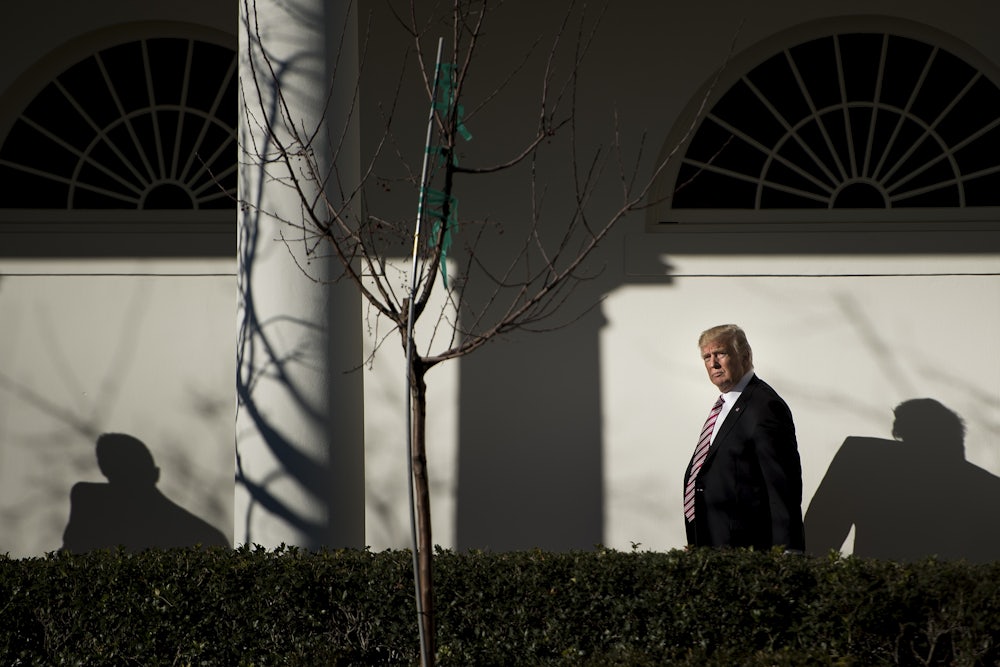President Donald Trump’s announcement Thursday that he’s withdrawing America from the Paris agreement was approximately 2,000 words long, but not once did he utter the phrase “climate change.” This was no accident, but a new, coordinated messaging tactic from the White House to avoid admitting that the president still believes that climate science is a hoax. On five occasions in the day leading up to Trump’s Rose Garden speech and in the hours afterward, senior White House officials and the president himself refused to answer direct questions about whether Trump accepts the scientific fact that climate change is real, harmful, and caused by humans.
On Wednesday, the day before Trump announced his decision, Press Secretary Sean Spicer was asked about Trump’s beliefs on climate science. “Honestly, I haven’t asked him,” he said. “I can get back to you.”
The same day, Trump himself dodged the question twice in a gaggle with White House pool reporters.
This is almost physically painful to read pic.twitter.com/9S1OKVauFi
— Emily Atkin (@emorwee) June 1, 2017
After Trump’s announcement on Thursday afternoon, EPA Administrator Scott Pruitt went on CNN and refused, three times, to say whether Trump thinks man-made climate change is real. “This is not about whether climate change is occurring or not,” Pruitt said.
At about the same time, on a call with reporters, a senior White House official said he had “not talked to the president” about his personal beliefs on climate change. He then made a similar argument as Pruitt’s, saying the question about Trump’s beliefs was not “on topic.”
And finally, on Friday afternoon, senior White House adviser Kellyanne Conway would only say Trump believes in “a clean environment.” Pressed three times, Conway didn’t budge. “You should ask him that,” she said. “I hope you have your chance.”
To be sure, no one actually needs to ask Trump this question anymore. He has openly (and falsely) denied climate science multiple times. He did this both before his presidential campaign and on the campaign trail—although on the campaign trail, he periodically denied that he ever called it hoax, which is a lie.
The concept of global warming was created by and for the Chinese in order to make U.S. manufacturing non-competitive.
— Donald J. Trump (@realDonaldTrump) November 6, 2012
But even after Trump was elected, then-incoming White House chief of staff Reince Priebus confirmed that Trump doesn’t accept the fact that humanity is threatened by the impacts of global warming. “He has his default position, which is that most of it is a bunch of bunk,” Priebus said.
But in a way, it makes sense why the Trump administration has now settled on the tactic of avoidance. If the Trump administration admitted the president’s true beliefs, he would be widely accused of using pseudoscience and conspiracy theories to guide major foreign policy decisions. And if the administration said Trump does believe climate change is real, that would not only anger Trump’s base—which he sought to appease by pulling out of the Paris agreement—but also violate Republican Party orthodoxy. Publicly admitting climate change is real would also require Trump to propose an alternative solution to Paris, one that Trump neither has nor intends to create.
Avoidance, on the other hand, could have a strategic purpose. Sander van der Linden, a researcher for Yale Program on Climate Change Communication, said, “Creating ambiguity and speculation around his personal views (by remaining silent) creates doubt in the public consciousness about what he does or does not believe in, and as such, may give credence to the notion that his decision to pull out of the Paris agreement is independent of his personal views.” Administration officials are indeed trying to make it seem like Trump’s decision to pull out of Paris has nothing to do with his personal views of climate change, and that instead it’s about protecting American jobs and negotiating a better deal for the country. That’s why they keep telling reporters to stay “on topic” when asked about Trump’s position.
No matter what Trump or his advisers say, his personal beliefs on climate change influenced his decision. How could they not? Trump also consulted with climate-change deniers like Steve Bannon, Scott Pruitt, and Mitch McConnell. Are we to believe they never discussed their shared belief that the Paris agreement attempts to solve a crisis that doesn’t exist? More likely, Trump and his aides are afraid of the reaction they’ll get if they admit they used fake news to make a decision that could impact the entire world. But they lack the courage to do so, which makes them cowards.
